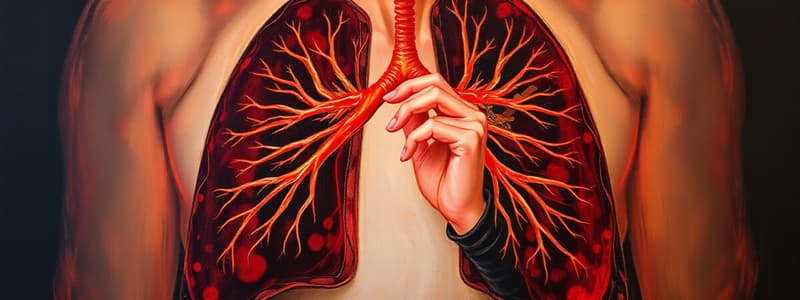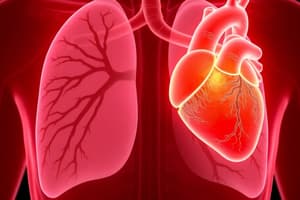Podcast
Questions and Answers
What is the primary action of Endothelin-1 Receptor Inhibitors?
What is the primary action of Endothelin-1 Receptor Inhibitors?
- Prevent pulmonary vasoconstriction (correct)
- Inhibit cGMP phosphodiesterase-5
- Enhance nitric oxide effects
- Directly vasodilate systemic arteries
Which of the following side effects is NOT associated with cGMP Phosphodiesterase-5 Inhibitors?
Which of the following side effects is NOT associated with cGMP Phosphodiesterase-5 Inhibitors?
- Indigestion
- Flushing
- Jaw pain (correct)
- Dizziness
What is a common use for Prostacyclins (PGI2) analogues?
What is a common use for Prostacyclins (PGI2) analogues?
- To treat erectile dysfunction
- To decrease pulmonary vascular resistance
- To increase platelet aggregation
- To manage pulmonary hypertension (correct)
Which drug is an example of an Endothelin-1 Receptor Inhibitor?
Which drug is an example of an Endothelin-1 Receptor Inhibitor?
What is a significant side effect of Endothelin-1 Receptor Inhibitors?
What is a significant side effect of Endothelin-1 Receptor Inhibitors?
Which mechanism of action is associated with cGMP Phosphodiesterase-5 Inhibitors?
Which mechanism of action is associated with cGMP Phosphodiesterase-5 Inhibitors?
What is a common side effect of Prostacyclins (PGI2) analogues?
What is a common side effect of Prostacyclins (PGI2) analogues?
Which drug primarily used for erectile dysfunction also treats pulmonary hypertension?
Which drug primarily used for erectile dysfunction also treats pulmonary hypertension?
Which of the following side effects is NOT typically associated with cGMP Phosphodiesterase-5 Inhibitors?
Which of the following side effects is NOT typically associated with cGMP Phosphodiesterase-5 Inhibitors?
What is the role of Endothelin-1 Receptor Inhibitors in treating pulmonary hypertension?
What is the role of Endothelin-1 Receptor Inhibitors in treating pulmonary hypertension?
What outcome results from the action of endothelin-1 receptor inhibitors?
What outcome results from the action of endothelin-1 receptor inhibitors?
Which side effect is commonly associated with cGMP phosphodiesterase-5 inhibitors?
Which side effect is commonly associated with cGMP phosphodiesterase-5 inhibitors?
Which of the following actions does prostacyclins (PGI2) analogues perform?
Which of the following actions does prostacyclins (PGI2) analogues perform?
What is a primary use of cGMP phosphodiesterase-5 inhibitors beyond treating pulmonary hypertension?
What is a primary use of cGMP phosphodiesterase-5 inhibitors beyond treating pulmonary hypertension?
Which of the following side effects is associated with endothelin-1 receptor inhibitors?
Which of the following side effects is associated with endothelin-1 receptor inhibitors?
What is a potential side effect of endothelin-1 receptor inhibitors?
What is a potential side effect of endothelin-1 receptor inhibitors?
Which mechanism of action is associated with prostacyclins (PGI2) analogues?
Which mechanism of action is associated with prostacyclins (PGI2) analogues?
Which of the following is a use of cGMP phosphodiesterase-5 inhibitors?
Which of the following is a use of cGMP phosphodiesterase-5 inhibitors?
What common side effect might a patient experience when taking cGMP phosphodiesterase-5 inhibitors?
What common side effect might a patient experience when taking cGMP phosphodiesterase-5 inhibitors?
Which drug class involves a mechanism that inhibits platelet aggregation?
Which drug class involves a mechanism that inhibits platelet aggregation?
What is the primary benefit of using Endothelin-1 Receptor Inhibitors in the treatment of pulmonary hypertension?
What is the primary benefit of using Endothelin-1 Receptor Inhibitors in the treatment of pulmonary hypertension?
Which side effect is commonly associated with cGMP Phosphodiesterase-5 Inhibitors?
Which side effect is commonly associated with cGMP Phosphodiesterase-5 Inhibitors?
Which mechanism of action is characteristic of cGMP Phosphodiesterase-5 Inhibitors?
Which mechanism of action is characteristic of cGMP Phosphodiesterase-5 Inhibitors?
What common side effect might a patient experience when using Prostacyclins (PGI2) Analogues?
What common side effect might a patient experience when using Prostacyclins (PGI2) Analogues?
What is a significant use for Sildenafil beyond its application in erectile dysfunction?
What is a significant use for Sildenafil beyond its application in erectile dysfunction?
What is a significant mechanism of action for Endothelin-1 Receptor Inhibitors?
What is a significant mechanism of action for Endothelin-1 Receptor Inhibitors?
Which side effect is most commonly associated with Prostacyclins (PGI2) Analogues?
Which side effect is most commonly associated with Prostacyclins (PGI2) Analogues?
Which of the following best describes the usage of cGMP Phosphodiesterase-5 Inhibitors?
Which of the following best describes the usage of cGMP Phosphodiesterase-5 Inhibitors?
What potential side effect would patients taking Endothelin-1 Receptor Inhibitors most likely encounter?
What potential side effect would patients taking Endothelin-1 Receptor Inhibitors most likely encounter?
What is a primary action of cGMP Phosphodiesterase-5 Inhibitors in relation to nitric oxide?
What is a primary action of cGMP Phosphodiesterase-5 Inhibitors in relation to nitric oxide?
Flashcards are hidden until you start studying
Study Notes
Endothelin-1 Receptor Inhibitors
- Competitively inhibit endothelin-1 receptors, reducing pulmonary vasoconstriction.
- Decreases pulmonary vascular resistance, useful in treating pulmonary hypertension.
- Notable side effects include hepatotoxicity, anaemia, diarrhoea, flushing, gastroesophageal reflux disease (GERD), and headaches.
- Bosentan is a primary example of this drug class.
cGMP Phosphodiesterase-5 (PDE-5) Inhibitors
- Inhibit the breakdown of cGMP by phosphodiesterase-5, enhancing nitric oxide's vasodilatory effects.
- Primarily used for pulmonary hypertension and erectile dysfunction.
- Common side effects are flushing, nausea, dizziness, headaches, indigestion, and nasal congestion.
- Sildenafil is a key example of a PDE-5 inhibitor.
Prostacyclins (PGI2) Analogues
- Directly induce vasodilation in pulmonary and systemic arteries.
- Primarily utilized for the treatment of pulmonary hypertension.
- Possible side effects include flushing, jaw pain, headaches, cough, myalgia, diarrhoea, vomiting, and nausea.
- Notable examples include Epoprostenol, which also inhibits platelet aggregation, and iloprost.
Endothelin-1 Receptor Inhibitors
- Mechanism: Competitively inhibits endothelin-1 receptors, reducing pulmonary vasoconstriction and lowering pulmonary vascular resistance.
- Uses: Primarily for pulmonary hypertension.
- Side Effects: Potential hepatotoxicity, anemia, diarrhea, flushing, gastroesophageal reflux disease (GERD), and headaches.
- Example: Bosentan is a key endothelin-1 receptor inhibitor.
cGMP Phosphodiesterase-5 (PDE-5) Inhibitors
- Mechanism: Inhibits PDE-5, which breaks down nitric oxide; this prolongs nitric oxide's vasodilatory effects, enhancing arterial dilation.
- Uses: Effective in treating pulmonary hypertension and primarily indicated for erectile dysfunction.
- Side Effects: Commonly cause flushing, nausea, dizziness, headaches, indigestion, and congestion.
- Example: Sildenafil is a notable PDE-5 inhibitor used in these contexts.
Prostacyclins (PGI2) Analogues
- Mechanism: Directly vasodilate pulmonary and systemic arterial vessels.
- Uses: Primarily indicated for pulmonary hypertension.
- Side Effects: May cause flushing, jaw pain, headaches, cough, myalgia, diarrhea, vomiting, and nausea.
- Examples: Epoprostenol, which also inhibits platelet aggregation, and iloprost are key prostacyclin analogues.
Endothelin-1 Receptor Inhibitor
- Competitively blocks endothelin-1 receptors, reducing pulmonary vasoconstriction and lowering pulmonary vascular resistance.
- Primarily prescribed for pulmonary hypertension management.
- Notable side effects include hepatotoxicity, anemia, diarrhea, flushing, gastroesophageal reflux disease (GERD), and headaches.
- An example of this class is Bosentan.
cGMP Phosphodiesterase-5 (PDE-5) Inhibitor
- Works by inhibiting phosphodiesterase-5, which prolongs nitric oxide's vasodilating effects.
- Mainly used to treat erectile dysfunction but also effective for pulmonary hypertension.
- Common side effects include flushing, nausea, dizziness, headaches, indigestion, and nasal congestion.
- Sildenafil is a prominent example of this medication class.
Prostacyclins (PGI2) Analogues
- Act as direct vasodilators, affecting both pulmonary and systemic arteries.
- Indicated primarily for the treatment of pulmonary hypertension.
- Associated side effects can include flushing, jaw pain, headaches, cough, myalgia, diarrhea, vomiting, and nausea.
- Notable medications include Epoprostenol, which also inhibits platelet aggregation, and Iloprost.
Endothelin-1 Receptor Inhibitor
- Inhibits endothelin-1 receptors to prevent pulmonary vasoconstriction.
- Reduces pulmonary vascular resistance, helpful in managing hypertension.
- Side effects include hepatotoxicity, anemia, gastrointestinal issues, flushing, gastroesophageal reflux disease (GERD), and headaches.
- A notable example is Bosentan.
cGMP Phosphodiesterase-5 (PDE-5) Inhibitor
- Blocks the breakdown of nitric oxide (vasodilator) by inhibiting cGMP phosphodiesterase-5 (PDE-5).
- Prolongs nitric oxide's vasodilatory effects, primarily used for erectile dysfunction but also applicable to pulmonary hypertension.
- Common side effects include flushing, nausea, dizziness, headaches, indigestion, and nasal congestion.
- An example of this class is Sildenafil.
Prostacyclins (PGI2) Analogues
- These analogues exert direct vasodilatory effects on both pulmonary and systemic arterial vasculature.
- Used primarily to treat pulmonary hypertension.
- Side effects may include flushing, jaw pain, headaches, cough, myalgia, and various gastrointestinal symptoms like diarrhea, vomiting, and nausea.
- Notable examples include Epoprostenol (which also inhibits platelet aggregation) and Iloprost.
Endothelin-1 Receptor Inhibitor
- Inhibits endothelin-1 receptors, reducing pulmonary vasoconstriction and vascular resistance.
- Indicated for pulmonary hypertension.
- Potential side effects: hepatotoxicity, anemia, diarrhea, flushing, gastroesophageal reflux disease (GERD), and headache.
- Example drug: Bosentan.
cGMP Phosphodiesterase-5 (PDE-5) Inhibitor
- Inhibits phosphodiesterase-5, enhancing nitric oxide's vasodilatory effects by preventing its breakdown.
- Primarily used for erectile dysfunction and also for pulmonary hypertension.
- Common side effects: flushing, nausea, dizziness, headaches, indigestion, and nasal congestion.
- Example drug: Sildenafil.
Prostacyclins (PGI2) Analogues
- Act as direct vasodilators in both pulmonary and systemic arterial vasculature.
- Primarily used to treat pulmonary hypertension.
- Notable side effects include flushing, jaw pain, headaches, cough, myalgia, diarrhea, vomiting, and nausea.
- Example drugs: Epoprostenol (also inhibits platelet aggregation) and Iloprost.
Endothelin-1 Receptor Inhibitor
- Competitively blocks endothelin-1 receptors, decreasing pulmonary vascular resistance.
- Utilized for managing pulmonary hypertension and other forms of hypertension.
- Notable side effects include hepatotoxicity, anemia, diarrhea, flushing, gastroesophageal reflux disease (GERD), and headaches.
- Bosentan is a primary example of this class of drugs.
cGMP Phosphodiesterase-5 (PDE-5) Inhibitor
- Inhibits PDE-5, preventing the breakdown of nitric oxide, thus enhancing vasodilation.
- Primarily indicated for pulmonary hypertension and erectile dysfunction.
- Common side effects consist of flushing, nausea, dizziness, headaches, indigestion, and nasal congestion.
- Sildenafil is a prominent drug within this category.
Prostacyclins (PGI2) Analogues
- Show direct vasodilatory effects on both pulmonary and systemic arteries.
- Used for the treatment of pulmonary hypertension.
- Side effects include flushing, jaw pain, headaches, cough, myalgia, diarrhea, vomiting, and nausea.
- Key examples include Epoprostenol (which also inhibits platelet aggregation) and Iloprost.
Studying That Suits You
Use AI to generate personalized quizzes and flashcards to suit your learning preferences.




